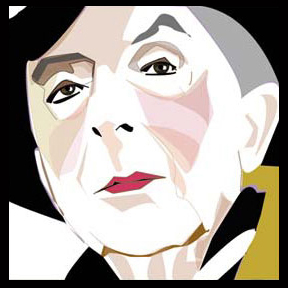|
A CENTENNIAL CELEBRATION! |
|
 |
THE QUENTIN CRISP ARCHIVES
KIRA BARNUM
Friend
|
I hadn’t lived in Manhattan since I was six, but when I started visiting twenty years later, in the 1990s, it still felt like going home. What made that feeling near complete was my knowing that while I had a past there, Mr. Crisp was a man of the future. So long as I could make him laugh, I was happy in this world.
Of course, how could he not be a man of the future, being so ahead of his time? Besides, when you belong to a persecuted minority group, you can never seriously pretend to believe in or cling to the “good old days.” Had it been practical to do so, I would only too gladly have lived in Manhattan to be near him and take him to lunch every week. Now that he’s gone, Manhattan feels like less than half of home. The question is, can we still preserve his memory and live out his lessons without indulging in too much nostalgia ourselves? Or without making the young cynics reject him? As I wrote previously in 2001, I like to believe that his more notorious remarks were merely his refusals to be taken too seriously, since there were so many things he refused to take seriously – war and politics, for example. Personally, though I’m not 100 percent sure that we can all be true stylists (after all, that brings to mind the saying “when everyone is special, no one is special”) I do think we can preserve his life lessons – partly through one of his idols, Miss Manners. That is, they had certain minor disagreements they probably didn’t even know about, but hardly anyone who’s read her books would argue with any of her philosophies, and one precious quality they shared was the understanding of the need to combine the old with the new. One unspoken disagreement I suspect they had was the subject of ladies vs. people. That is, Mr. Crisp wrote, in effect, that since women used to be nicer than people, they couldn’t be both ladies and people, then or now. However, Miss Manners has written that manners are not necessarily about making other people comfortable. She said: “Sometimes you have to upset people – or an entire society. A lot of people got upset at the feminist movement because men had all the toys and women wanted some.” (And, to my knowledge, almost no one claims anymore that it’s unladylike for women to vote, go to graduate school, or play sports – but people used to.) Of course, it’s also possible for people to make fools of themselves with too many protests – as he said in his one-man show, in the 1970s, his landlady once went out to take part in a protest and got into the wrong march. One problem I had was that when I got to see him, I was frequently somewhat tongue-tied because it could be very difficult to know when you might be boring him. (I did better on the phone, with him.) However, he always could turn even small talk into entertainment, as everyone knows. I asked him once, in the summer (he’d been a U.S. resident alien for nearly two decades) if he’d been to any Fourth of July parties and he said: “No. That’s the one battle I didn’t win.” And, at the least, while I don’t know whether he did this with everyone or not, he eventually was willing to use me as a semi-therapist, just as others used him as such. One story I remember was after one of his last trips to Atlanta, when I happened to call him and very soon he started talking nonstop about how frightening the trip was because he’d been sent on the wrong day and no one was at the airport to greet him. On another occasion, I told him the story of how John Hurt, after playing him in The Naked Civil Servant, had had some taxi rides where the drivers wouldn’t accept payment. Mr. Crisp didn’t seem to be familiar with the story (he may have been just pretending), so I said: “Do you know why they wouldn’t take it?” “No.” “Because of that taxi scene where….you know….” He cackled. He was the only friend I always called “Sir.” May he live, not merely in our hearts, memories, bookshelves or fashion statements, but in our actions, whether public or private. May he especially help us to keep the traditions that say that people are the only truly worthwhile pastime, that good manners are how one wins, not loses, that happiness is better than possessions (or, as he said: “Happiness is lots of money and no possessions”) and that love is found in abundance from the oldest and the youngest if one is only willing to listen, even when one is being judged. And, of course, may we keep alive his unbeatable courage…as Michael Holroyd wrote: “In 1931, it was something more." |

Site Copyright © 1999–2009 by the Quentin Crisp Archives.
All rights reserved.

